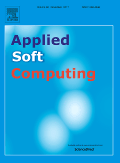Today, Prof. Dr. Thomas Weise has joined the Editorial Board of the Applied Soft Computing journal published by Elsevier and indexed by SCI and EI with an impact factor of 3.541 during the last two years and 3.811 during the previous five years. The topics of this journal and the research focus of our Institute fit very closely together: we develop tailor-made applications of optimization, Operations Research, Computational Intelligence, Evolutionary Computation, Metaheuristics, as well as Machine Learning and Data Mining for industry partners to help them to become more efficient, faster, and environmentally friendlier while, at the same time, reducing costs and improving product and service quality. Applied Soft Computing is an international journal promoting an integrated view of soft computing to solve real life problems. Soft computing is a collection of methodologies, which aim to exploit tolerance for imprecision, uncertainty and partial truth to achieve tractability, robustness and low solution cost. The focus is to publish the highest quality research in application and convergence of the areas of Fuzzy Logic, Neural Networks, Evolutionary Computing, Rough Sets and other similar techniques to address real world complexities.
The scope of this journal covers the following soft computing and related techniques, interactions between several soft computing techniques, and their industrial applications:
- Ant Colony
- Chaos Theory
- Evolutionary Computing
- Fuzzy Computing
- Hybrid Methods
- Immunological Computing
- Morphic Computing
- Neuro Computing
- Particle Swarm
- Probabilistic Computing
- Rough Sets
- Wavelet
The application areas of interest include but are not limited to applications of soft computing to:
- Agricultural Machinery and Produce
- Autonomous Reasoning
- Bio-inspired Systems
- Biomedical Engineering
- Condition Monitoring
- Consumer Electronics
- Data Mining
- Data Visualisation
- Decision Support
- Engineering Design Optimisation
- Fault Diagnosis
- Human-Machine Interface
- Industrial Electronics
- Intelligent Agents
- Intelligent Information Retrieval
- Internet Tools
- Manufacturing Systems
- Motion Control and Power Electronics
- Multi-objective Optimisation
- Nano and Micro-systems
- Power and Energy
- Process and System Control
- Process Optimisation
- Reactive Distributed AI
- Robotics
- Signal or Image Processing
- System Identification and Modelling
- Systems Integration
- Telecommunications
- Time Series Prediction
- Virtual Reality
- Vision or Pattern Recognition

